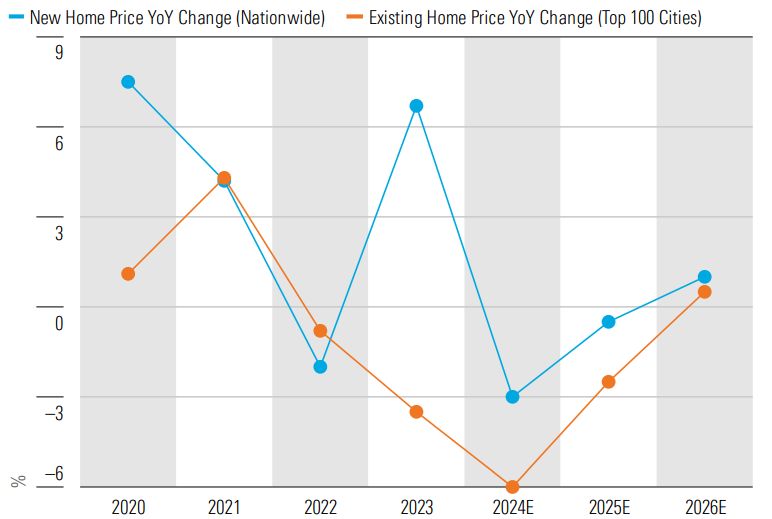China’s property market continued to decline in the first half of 2024, but is showing positive signs with the downward trend slowing in the second quarter, as government stimulus measures appear to be having an impact, according to a new report.
In May the People’s Bank of China issued a series of policy measures aimed at perking up the market, US financial services firm Morningstar says in the report. These included lowering the down payment ratio to 15% for the first home and 25% for the second home, removing the mortgage rate floor, and cutting housing provident fund loan rates. In June, first-tier cities including Shanghai, Shenzhen, Guangzhou, and Beijing followed suit and unwound home-buying restrictions.
The policy incentives appear to have drawn positive feedback from the market. The year-on-year contraction in new home sales narrowed to 22% in Q2 versus 33% in the first three months of the year. New home sales in terms of floor area also saw a slight increase in Q2, compared with previous quarter, the report says.
However, secondary home prices remained weak in Q2 amid a substantial oversupply across China. As the new policy measures encourage switching to new units, more homeowners have listed existing properties, adding pressure to secondary home pricing. Since the glut may take longer to be absorbed, Morningstar expects existing home prices will remain under pressure in the short run.
Home prices yet to bottom out but pressures to ease in 2025, rebound in 2026
 Sources: National Bureau of Statistics, Commercial Real Estate Insurance Services, Morningstar
Sources: National Bureau of Statistics, Commercial Real Estate Insurance Services, Morningstar
Tier 1 and Tier 2 cities showed more resilience in terms of home prices, while lower-tier cities saw steeper price declines. Morningstar expects home demand to recover gradually as benign policies take effect.
Amid a tight liquidity environment, sizable state-owned developers have proved more resilient. Homebuyers still prefer state-owned names, given their better track record in project delivery and stronger balance sheets. China Overseas Land & Investment and China Resources Land stand out, given their faster sales expansion and stronger financial positions. Both saw year-on-year growth in contracted sales value turn positive in June.
For the whole of 2024, Morningstar forecasts a mid-teens year-on-year decline in new home sales value, citing the lingering demand slump in the first six months. However, with more policy relaxation in wealthy regions, the second half could see an inflection point from the low base a year ago.
The national average for new home prices is expected to fall by around 3% this year amid soft contracted sales and pressure from excess inventory.
Home prices have yet to bottom out, but pressures are expected to ease in 2025, with a rebound anticipated in 2026, Morningstar says.









